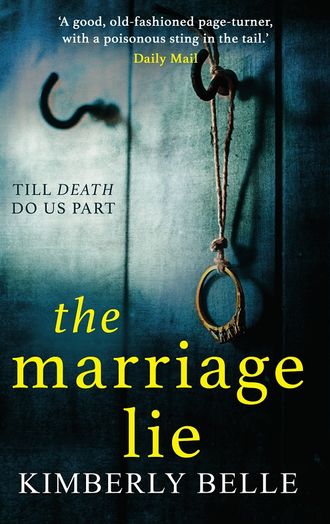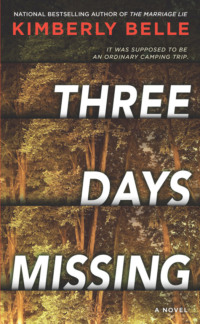
Полная версия
The Marriage Lie: Shockingly twisty, destined to become the most talked about psychological thriller in 2018!
He concedes the point with a one-shouldered shrug. “Of course not. But can I ask you something else without you biting my head off?” He pauses, and I give him a reluctant nod. “What’s in Seattle? Besides rain and Starbucks and too much plaid, I mean.”
I lift both hands. “Beats the hell out of me. Will grew up in Memphis, and he moved to Atlanta straight out of grad school at University of Tennessee. His entire life is here on the East Coast. I’ve never even heard him talk of Seattle. As far as I know, he’s never been there.” I twist on the couch, stare into cat eyes the same dark olive shade as mine. “But what you’re really asking is, do I think Will is having an affair.”
Dave gives me a slow nod. “Do you?”
My stomach twists—not because I think my husband was cheating on me, but because everybody else surely will. “No. But I don’t think he was on that plane, either, so clearly I’ve not got the tightest grip on reality. What do you think?”
Dave falls silent for a long moment, contemplating his answer. “I have a lot of unanswered questions when it comes to my brother-in-law. Don’t get me wrong, I adore the guy, mostly because of how fiercely he loves you. You can’t fake that kind of love, the kind that, every time you walk into the room, fills his face with so much happiness that I have to turn away—and I’m a gay man. I eat that shit up. So to answer your question, no. I don’t think your husband was having an affair.”
My heart, which was already hanging by a thread, cracks in two. Not just at Dave’s belief in my husband or his talking about him like he’s still here, but more so that my brother’s love for me is so intense, it extends by default to another person. I curl my palm around his biceps and lay my head on his shoulder, thinking I’ve never loved Dave more.
“Anyway, what I’m trying to say is, Will came into your life solo. His parents are dead, he has no siblings, he never talks about any other family or friends. Everybody has a past, but it’s like his life began when he met you.”
Dave is only partly right. Will has a lot of colleagues and acquaintances, but not a lot of friends. But that’s because, for techies like Will, it takes a lot for him to open up.
I sit up, twist on the couch to face my brother. “Because he lost track of all his high-school friends except for one, and he’s moved off to Costa Rica. He runs a surfing school there or something. I know they still exchange regular emails.”
“What about all the others? Friends, old neighbors, workout partners and drinking buddies.”
“Men don’t collect friends like women do.” Dave gives me a look, and I amend. “Heterosexual men don’t collect them. They don’t feel the need to run with a huge pack of people, and besides, you know Will. He’d rather be at home on his laptop than in a loud, crowded bar any day.” It’s part of the reason we eloped to the mountains of North Carolina seven years ago, with only my parents and Dave and James as witnesses. Will doesn’t like crowds, and he hates people fussing over him.
“Even introverts have a best friend,” Dave says. “Who’s Will’s?”
That’s an easy one. I open my mouth to answer, but Dave beats me to the punch. “Besides you, I mean.”
I press down on my lips. Now that my name is off the table, Dave’s question has me perplexed. Will talks about a lot of people he knows, but he never really defines them as friends.
Dave yawns and slumps deeper into the couch, and it’s not long before he forgets his question and nods off. I sit there next to my snoring brother, watching the horrific images flash by on the television screen but not really seeing them.
I’m thinking about our first anniversary, when I surprised Will with a road trip to Memphis. I’d spent weeks planning it, my version of a this is your life tour along all his old haunts, puzzling the stops together from the few stories he’d told me of growing up there. His high-school alma mater, the street where he’d lived until his mother died, the Pizza Hut where he’d worked evening and weekend shifts.
But the closer we got to the city, the more he fidgeted, and the quieter he became. Finally, on a barren stretch of I-40, he admitted the truth. Will’s childhood wasn’t pleasant, and his memories of Memphis weren’t exactly something he wanted to revisit. Once was hard enough. We hung a U-turn and spent the weekend exploring Nashville’s honky-tonks instead.
So, no, Will didn’t like to talk about his past.
But Seattle? What’s there? Who’s there?
I look over at my sleeping brother, at his chest rising and falling in the darkness. As much as I want to keep Dave’s suspicions at bay, to barricade his doubts about Will from my brain, the questions sneak back in like smoke, silent and choking.
How well do I know my husband?
7
When I come downstairs next, it’s close to ten in the morning. My family is scattered around the kitchen, drinking coffee and listening to James read news of the crash aloud from a website on his iPad. From where he’s seated at the table, Dad coughs into a fist. James stops mid-sentence, and they look at me with a combination of guilt and concern, like four kids I caught stealing from my cookie jar.
“They found the black box?” I say without preamble.
Mom drops the spatula into a skillet of half-cooked eggs and whirls around, looking like she didn’t fare much better than I did in the sleeping department. Dark circles spread under her eyes like bruises, and her hair, normally an inspired work of hot-roller wizardry, hangs listless around her puffy face. “Oh, sweetheart.” She rushes across the kitchen tile, snatching me into a ferocious hug. “My heart is just breaking for you. Is there anything I can do? Anything you need?”
There are a million things I need. I need to know what made Will board that plane. I need to know what happened to make it fall from the sky. I need to know what his last moments were like, if he went down screaming or without warning, if one moment he was debating peanuts versus pretzels and the next he was dust. I need to know where he is—literally and exactly. Will there be a body to bury?
But most of all, I need Will to be where he said he was going to be. In Orlando.
I untangle myself from Mom’s arms. I look to James, since he was the one reading the news. “Do they know why it crashed?”
“It’ll be months before they say for sure,” James says, his voice careful. He takes me in with his blue-eyed doctor’s gaze, methodical and thorough, like he’s trying to take my pulse from the other side of the kitchen counter. “How did you sleep?”
I shake my head. I didn’t miss the way everyone exchanged looks at my question about the crash, and I sure as hell don’t want to talk about my lack of sleep. “Just tell me, James.”
He hauls a breath, his gaze sliding over my right shoulder to Dave, as if asking for permission. Dave must have nodded, because James’s gaze returns to mine. “Keep in mind this is just a theory at this point, but the media is speculating a mechanical problem followed by pilot error.”
“Pilot error.” The words come out sluggish, like my tongue is coated in molasses.
James nods.
“Pilot error. As in, somebody fucked up, and now my husband is dead.”
James grimaces. “I’m sorry, Iris, but it sure sounds that way.”
Bile rises in my throat, and the room sways—or maybe it’s just me.
James hops off his stool and rushes around the counter, steadying me with a palm around my elbow. “Would you like me to give you something? I can’t medicate your grief away, but a pill can help take the edge off, at least for the next few days.”
I shake my head. My grief, as spiky as it is, feels like the only thing binding me to Will. The thought of losing that connection, even the rawest, sharpest edges of it, fills me with panic.
“I wouldn’t say no to a Xanax,” Dave says.
James gives me a look, one like your crazy brother, then pats my arm. “Think about it, okay? I can write you a prescription for whatever you need.”
I give him my best attempt at a smile.
“Come.” My mother steers me to the kitchen island, overflowing with food. A platter of scrambled eggs, a mini mountain of bacon and sausage swimming in grease, an entire loaf of toasted bread. For Mom, there’s no better way of demonstrating her love than with heavy, hearty food, and this morning, her love is big enough to feed an army. “What would you like?”
I take in the food and the smell hits me, buttery eggs and fried pork grease, doing somersaults in my stomach. “Nothing.”
“You can’t not eat. How about I whip up some pancakes? I’ll make the Dutch kind and load them up with apple and bacon, just the way you like.”
Dave looks over from the coffeepot, where he’s measuring out the grounds. “Ma, leave her alone. She’ll eat when she’s hungry.”
“C’mere, Squirt,” Dad calls out from his seat at the table, patting the chair beside him. “I saved you a spot.”
My father is a former marine and a brilliant engineer with an easy smile and a halfway decent jump shot, but his greatest talent is running interference between my brother and me and our mother.
I sink onto the chair and lean into him, and he slings a beefy arm around my shoulders. My family is not a demonstrative clan. Hugs happen only at hellos and goodbyes. Kisses are rare, and they usually stop just short of skin. So far today I’ve held my brother’s hand, collapsed in my mother’s arms and snuggled up to my father. This is what death does. It forces intimacy at the same time it snatches it away.
My gaze falls on the legal pad, covered in Dad’s block-letter scribbles. Pages and pages of bullet points, grouped into categories and ranked by level of importance. If Will were here, he and my father would bond over the beauty of this list, a masterpiece of left-brained brilliance. I push aside Dad’s reading glasses and scan the papers, a string of knots working their way across my shoulder blades. It seems unfair there are so many tasks to tackle, when all I really want to do is go back to bed and forget yesterday ever happened.
And then I notice a grouping of four or five bullets at the bottom.
“Compensation?” I say, and there’s venom in my tone.
“Airlines provide a sum of money to victims’ families, Iris. I know it seems harsh, but I’m just looking out for my baby girl. I will make sure you’re provided for.”
As if Liberty Air can fix their shoddy planes and bungling pilots by throwing around some cash. Oh, we killed your husband? Here, go buy yourself something nice.
“I’d rather starve to death than touch a penny of their blood money.”
“Fine, then don’t touch it. Put it in the bank and forget all about it. I’m still going after it for you.”
I grab the pen and add my own bullet to the list: research victims’ families’ charities. Someone might profit from Liberty Air’s money, but it sure as hell won’t be me.
The next page is more of the first, and after a quick scan I flip to the next and then the next, stopping short at what I read across the top: MEDIA. Underneath, my father has created a long and extensive log of calls received, complete with date, time, name of caller and outlet. I don’t recognize all the names, but more than a few jump out at me. People magazine. The Today show. The Atlanta Journal-Constitution. Diane Sawyer. USA TODAY.
“How did they find me? Our number’s unlisted.”
Dave settles in at the head of the table with an egg-and-bacon sandwich. “I don’t know, but the phone has been ringing off the hook. We unplugged it an hour ago. And last time I looked, there were three news vans parked out front.”
“Seriously?”
“Seriously. And you know that photo of you and Will from last New Year’s Eve? It’s all over the internet.”
They could have chosen a worse picture, I suppose. Me and Will in our holiday finest, our faces lit up with goofy grins as he dips me over an arm. I loved it so much I made it my Facebook profile picture, which, now that I think about it, is probably where they got it.
Mom slides a plate with a mini mountain of food in front of me. “Here, liefje. Try to eat at least a few bites.”
I pick up my fork, cut off a mini slice of sausage and push it around my plate until Mom heads back into the kitchen.
Dad flips to the next page of his list. “Liberty Airlines has established a Family Assistance Center at the international terminal at Hartsfield. A lady by the name of—” he slips on his glasses and consults the paper “—Ann Margaret Myers is your point of contact.”
Dave snorts around a giant bite of food. “What kind of idiot plans a gathering for plane crash next of kin at the airport?”
“Liberty Air ones, apparently,” Dad says. “They want us down there so they can, and I quote, provide comfort and counseling, discuss plans and answer any questions.”
“Plans?” I say. “What kind of plans?”
“Well, for starters, they’re talking about a memorial service as soon as this weekend.”
Dad’s gentle tone does nothing to stop a familiar anger from sparking like a flash fire. A Liberty Air memorial service feels like an insult, like the neighbor who buys you flowers after they run over your dog. I won’t accept their public display of penitence, and I can’t forgive their mistake.
“So now I’m supposed to accept help from the people responsible for killing my husband? That’s absurd.” I shove my plate to the center of the table, and the pyramid of scrambled eggs landslides over the rim.
“I know it seems that way, punkin’, but it won’t be just Liberty Air. The Red Cross will be there, too, as well as folks whose sole job is to collect information about the crash. I want to hear what they know that we haven’t gotten from the TV or newspaper.”
“Maybe you can ask them who alerted the media before my daughter,” Mom says, slamming the salt and pepper shakers onto the center of the table. “Because that is an unforgivable blunder, and I’d like to tell that person what I think of them.”
“Whoever made that mistake will be out of a job, I’ll see to it.” Dad uses his drill-instructor voice—forceful, booming and unambiguous. He turns, and his expression morphs from fierce to fiercely concerned. “Sweetheart, like it or not, we’re going to have to interface with Liberty Air at some point. I can be a buffer if you want me to, or I can stand back and let you handle it yourself. Up to you. Either way, at the very least, we should go down there and see what this Miss Myers has to say, don’t you think?”
No, I don’t think. I’ve seen that footage—sobbing family members pushing their way through a sea of cameras, keen to capture their despair for all the world to see. And now Dad is suggesting we become a part of them?
Then again, I have so many questions, not the least of which is what did you do to my husband? If this Ann Margaret Myers has an answer for that one, she can plaster my teary, snotty face on the high-definition LED screens at SunTrust Field for all I care.
I push away from the table and head upstairs to get dressed.
* * *
On the last night of Will’s life, he cooked. Not something out of a box or the freezer section, but a whole-food, homemade meal. For someone who didn’t know how to cut a tomato when I met him, whipping up dinner must have been no easy feat, and it probably took him all day. Maybe something inside him knew what was coming, some otherworldly awareness that his cosmic clock was about to hit zero, but that night—our seventh anniversary—he surprised me with real food, and for the first time ever made by his own hands.
I found him bent over one of my cookbooks in the kitchen, the most amazing smell hanging in the air. “What’s going on?”
He whirled around, a twig of thyme dangling from a curl and a mixture of pride and guilt on his expression. “Um, I’m cooking.”
I could see that. Anyone could see that. He’d used every pot and pan we owned, and covered the entire countertop, every single inch, with food and ingredients and cooking utensils. Will was covered in flour and grease.
I smiled. “What are you making?”
“Standing rib roast, new potatoes in butter and parsley, and those skinny green beans wrapped in bacon, I forget what they’re called.”
“Haricots verts?”
He nodded. “I’ve got dessert, too.” He gestured to two chocolate lava cakes in white ramekins, cooling on a rack by the oven. He’d even sprinkled them with powdered sugar. When I didn’t respond, he said, “We can still go out if you want to. I just thought—”
“It’s perfect,” I said, meaning it. I didn’t care that the kitchen was a wreck, or that we’d miss our reservations at the new sushi hot spot in Buckhead. Will cooked, and for me. I smiled and leaned in for a kiss. “You’re perfect.”
The meal, however, was not. The roast was overdone, the potatoes were mushy, and the haricots verts were cold, but no food had ever tasted better. I ate every single bite. Afterward, we took the cakes upstairs and devoured them in bed, kissing and licking and growing delirious on chocolate and sex, loving like there was no tomorrow.
But tomorrow came.
8
“Mrs. Griffith, let me begin by expressing my deepest condolences for the loss of your husband.”
Dad, Dave and I are sitting shoulder to shoulder, a united front across from our Liberty Airlines point of contact, Ann Margaret Myers, a thin, blonde woman in a punishing ponytail. The tag hanging from her neck identifies her as Care Specialist, and I hate her on sight. I hate her starched pink blouse and the way she’s buttoned it up all the way to the notch in her throat. I hate her long, French-tipped fingernails and the way she clasps her hands so fiercely together that the skin turns white. I hate her thin lips and her mud-puddle eyes and her mask of empathy so exaggerated, I have to sit on my hands so I don’t punch it off her face.
My father leans both forearms onto the wooden table. “Actually, Ms. Myers, we’d like you to begin with an explanation of how the media learned Will’s name before his own wife was told he was on the plane.”
Ann Margaret’s spine goes ramrod straight. “Excuse me?”
Dad lifts a shoulder, but the gesture is anything but casual. “You’d think an airline would have better ways of informing the next of kin than releasing the passengers’ names to the media, but what do I know? I suppose you folks at Liberty Air have a different way of doing things. What I can tell you is that your policy is a shitty one.”
“I...” Her lips flap around like a stranded fish, and her gaze flits back and forth between me and my father. “You learned about Mr. Griffith from the news?”
The three of us nod, once and in unison.
“Oh, my God, I had no idea. I can assure you, Mrs. Griffith, Mr. Stafford, that is absolutely not Liberty Air’s policy. Someone over there made a huge, grave error, and I am so very, very sorry.”
I know what she’s doing. She’s distancing herself from both the airline and their mistake, and I’m not buying it. Not even a little bit.
And judging from his scowl, neither is my father. “I appreciate that, Ms. Myers, but I’m sure you can understand that an apology from you isn’t going to cut it. We’d like an explanation, and we want to hear it from the person responsible.” He leans back and crosses his arms, commanding, authoritative and in charge. On a good day, my father is someone to be reckoned with. Today he’s supreme command.
Ann Margaret is clearly rattled. “I absolutely understand. As soon as we’re done here, I will find out what went wrong and then coordinate a face-to-face meeting between that person and your family. Does that sound like an acceptable solution to the three of you?”
Dad gives her a curt nod, but I don’t move. To me it sounds like her throwing us a bone, but I’m too tired, too shaken and shattered to say anything without flying across the desk and wrapping my hands around her neck.
The room Liberty Airlines has stalled us in is an airline executive lounge in Hartsfield’s brand-new international terminal. It’s plush and roomy, decorated in dark jewel tones, with sitting areas and a bar and an entire wall of windows overlooking the concourse. Airplanes lumber back and forth on the other side of the glass like giant missiles, taunting me with murderous intent.
“Has the press found you yet?” Ann Margaret says, and I turn back to the table.
Dave nods. “They’ve been calling the house all morning, and there are a couple of vans camped out on the street. Some of the reporters even had the nerve to ring the doorbell and ask for an interview.”
She shakes her head, disgusted. “We’ve specifically asked the media outlets to respect the privacy of our families, but not all of the journalists listen. What I can do is make sure you get out of here without having to interact with them. And may I suggest you appoint a family friend to be media contact? That way, you won’t have to talk to them until you’re ready.”
My father adds another bullet to his list, which has grown to a handful of pages.
All around us, people are weeping. A silver-haired man with unshaven cheeks, an Indian woman in a teal-and-silver sari, a black teenager with diamond studs bigger than my engagement solitaire. Tears roll down their cheeks unchecked, and the air in the room pulses with despair. Seeing their sorrow is like watching someone yawn, uncontrollable and infectious. Suddenly and without warning, I’m weeping, too.
Ann Margaret passes me a pack of tissues.
“Ms. Myers,” Dad says, “perhaps you could give us a quick update on the crash. Is there any new information?”
“Please. Call me Ann Margaret, and of course. As you may have heard on the news, both black boxes have been recovered, the flight data recorder and the cockpit voice recorder, and they’ve been sent on to the National Transportation Safety Board for analysis. I do want to warn you, though. Their final report will likely take months, if not years.”
I wince. A month feels like an eternity, but years?
“In the meantime...” She pushes a packet of paper an inch thick across the desk and taps a fingertip on a website address printed across the top. “This is a dark website, meaning it’s not meant for the general public. There are no links leading to it, and only people who type in the exact address will be able to find it. Liberty Airlines will use it to issue statements and provide updates to friends and family of the passengers as soon as information becomes available. You’ll also find a list of contact names, phone numbers and email addresses for every employee on the disaster management team. They are available 24/7, as am I. You are my family, and as such, my very first priority.”
I look up. “What do you mean we’re your family?”
She smiles at me, not unkindly. “Every passenger’s family receives their own Care Specialist. I’m yours. You are my family. If there’s anything at all that any of you need, all you have to do is say so and I’ll take care of it.”
“Excellent. You can start with giving me back my husband.”
Her shoulders fall a good inch, and she tilts her head, reassembling her empathy mask. “I wish I could do that, Mrs. Griffith. I really do.”
I hate this woman. I hate her with such an intensity that for a second or two, I actually blame her for the crash. I know Ann Margaret is not the one who performed the sloppy safety check or who banked left when she should have banked right, but I don’t believe her I’m on your side here attitude, either. If this woman really had my best interests at heart like she claims, she’d tell me what I really want to hear.
“How did my husband get on that airplane?”
It takes Ann Margaret a second or two to register my change of subject, and then she gives me an apologetic smile. “I’m sorry, I’m not sure what you mean.”
“What I mean is, did someone actually see him walk on? Because he was late leaving the house, and even if he didn’t hit rush-hour traffic, which he most probably did, he would have had to haul ass through security and to the terminal. He probably would have been the last person on the plane, if he even made it on time.”






